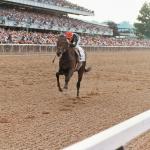
Afleet Alex: Amazing Athlete Earned Improbable Preakness Win

There’s no more thankless job in horse racing than the lot of a morning line oddsmaker.
Much like an umpire or a referee in a professional sport, if an oddsmaker does his job well, no one notices. But if something goes awry, count on Twitter going abuzz in a snark-nado.
How this impacts a day at the races is that gamblers have to learn how to employ the morning line into their handicapping and understand its relative importance.
First of all, keep in mind that a morning line is not a prediction of who will win the race. The intent is to frame how the betting on the race will unfold. The odds are usually based on horse’s chances of winning the race, though sometimes a particularly hot trainer or jockey will prompt the oddsmaker to lower the price on a horse with those connections.
How an oddsmaker and handicappers exist at opposite ends of the wagering universe is best reflected in how there’s a favorite in every race, but, on the average, favorites only win about 30 percent of the time. So, while oddsmakers search for favorites, handicappers look for the horse who will win the race.
Yet there are times when a handicapper can glean some helpful insight from the morning line.
While there’s no hard and fast rule to follow, when there’s a big discrepancy in the morning line and the actual odds, it’s worth the time and effort to find out why that happened.
Let’s take a look at the Jan. 13 card at Gulfstream Park for some interesting examples of when spotting differences in the morning line and live odds can be beneficial.
In the first race, Rythmofsimmard went off at 14-1 after finishing third once and fourth twice in her last three races. He had a jockey who was 0-for-23 at the meet, so that price didn’t seem out of whack.
Until someone checked out the morning line. Rythmofsimmard was listed at 4-1 in the morning line and was the third choice in the race.
From 4-1 to 14-1 is a big jump and demands some form of inspection to see who was right, the oddsmaker or the betting public. In this case, Rythmofsimmard had finished 2 ¼ lengths behind Another Softball in his last start. Another Softball was now the 7-2 second choice in the morning line and the 5-2 betting choice in the wagering.
Considering that Another Softball was 5-2, a horse like Rythmofsimmard, who was about two lengths behind him, probably deserved to be 5-1 or less and the third or fourth choice in the race. Instead, she was 14-1 and the seventh choice in a field of 10. That adds up to an overlay and handicappers who saw some merit in the morning line price were rewarded quite nicely when she won by a neck, paying $30.20.
Score one for the oddsmaker.
A different type of race that usually becomes a headache for an oddsmaker involves races filled with first-time starters. In this case, the race could be a guessing game in terms of establishing a morning line.
Most times, the oddsmaker will try to side with experienced horses and that was the case in the seventh race on Jan. 13 at Gulfstream. Dirty, who was fourth and second in his first two starts, was pegged as the 2-1 morning-line favorite in a field of 11 3-year-olds that included seven first-time starters.
At 7-2 was Magnum Moon, a firster from seven-time Eclipse Award-winning trainer Todd Pletcher. Figuring that a Pletcher horse making its debut will be well-bet and a factor in the race is a no-brainer at most meets, so that price seemed fair, even though Magnum Moon’s works were on the slow side with clockings of 49 seconds (for a half mile), 1:03 1/5 (5/8 of a mile) and 50 2/5 seconds (half mile).
Also included in the field was Under a Spell, who was pegged at 10-1 in the morning line. He was first-time starter from trainer Alan Goldberg with some quick works of 48 1/5 seconds, 48 2/5 seconds and 1:01 out of the gate.
Perhaps 10-1 was a tad high, but it was difficult to anticipate that Under a Spell would go off as the 5-2 favorite. While that would seem to be an underlay, here it painted a rather vivid picture of a stable’s intent. Apparently, listening to cash being wagered on him, there was something to like in Under a Spell’s works.
Given all of the inherent uncertainty in first-time starters, the action on Under a Spell was more telling than the morning line.
How it worked out was that Magnum Moon won for Pletcher, with the only surprise being that he went off at 7-2 instead of a lower price.
As for Under a Spell, he finished 4 ½ length behind in second. The money wasn’t completely accurate, but it was telling and taught an important lesson.
If the morning line is off base, take a close look and see if there’s a discernible reason why it happened and bet accordingly. Cashing tickets always beats griping.